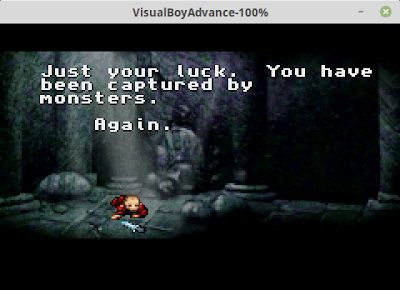So I recently ventured into the world of saving progress on the DS. And, like sound, it opened up a whole can of worms. (To be fair, I knew this can of worms was coming, but I kept putting it off).
So, the background, for all you people that don't do DS development:
In the olden days, cartridge-based games used battery-backed ram to save data. Which was still the case in certain GBA games. But in some GBA games, and as far as I know, all commercial DS games, save data is stored using EEPROM. The homebrew DS cards, though, from everything I've read, don't properly support EEPROM (at least accessing it via homebrew methods), but instead, we have a file system to work with, for reading and writing data. But it's not quite as simple as that.
All the homebrew cards are slightly different, but most of them adapt between a micro SD card and the DS. BUT the underlying way to read/write the filesystem on the SD card differs between the different homebrew cards. Enter some smart guy called Chishm and his awesome libfat/DLDI. This guy wrote a file access library (libfat) and a fancy system of patching compiled games with drivers for the different cards. So you write your game using libfat, and if somebody wants to play it on card XYZ, they run the patcher with the XYZ driver.
There's all sorts of other crazy and cool ways of dealing with it all, like people have written other utilities that stuff a whole file system into data appended in your executable file, so the whole DS game and save data and whatnot can be shoved into one file.
OK, enough of the 10-second crash course on libfat and DLDI. So I read up on this stuff, got libfat set up, and it all seems to be working. I toyed with using EFS, which does an appended file system like I mentioned above, but eventually decided against it, as I want it to be easy for people to update the main game file (like when I release bug fixes) without losing their save data. The other annoyance is that using basic libfat stuff, it crashes my emulator. It works fine on the actual hardware, so it's not a huge deal, and the emulators always have the ability to save state, so they don't really need a save file, but I need to go in and make sure it at least doesn't crash.
Other than that, and a couple minor bugs (I'm not rebuilding the initial level screen correctly after loading a saved game), saving and loading is working (at least on the M3 that I'm testing on...Electrobee also gave me an Edge card, so I need to make sure the saving/loading works correctly on it as well).
Once I get this done, the only things left are small cosmetic changes: getting the end-of-game splash screens and credits looking all nice, making sure all the transitions between splash screens, game over screens, menus, etc are all good, finding better intro music, fixing the flavor text on enemy portraits, and testing testing testing. Oh, and I've noticed I have a bunch of warnings in my code about improper pointer conversions. I need to go through and fix all those...I'm one of those people that doesn't want to see a single warning in my code when I compile....
I started by blogging the process of porting my homebrew game Anguna from the Gameboy Advance to the Nintendo DS. Now, my random thoughts on development and chronicling whatever hobby project catches my fancy.
Subscribe to:
Post Comments (Atom)
NES Anguna
Well, I had a little bit of time still, while Frankengraphics is finishing up her game Project Blue, to have a little downtime on Halcyon, s...

-
So I've recently purchased DosBox Turbo , the best (as far as I can find) implementation of DosBox for Android, and have been playing th...
-
The real trick for Spacey McRacey (as I'm calling it now) is going to be making it fun. And that's what I'm rather unsure about...
-
When I'm too tired/frustrated to work on my NES game, I've been playing around with ideas for another hobby project that I've he...


No comments:
Post a Comment